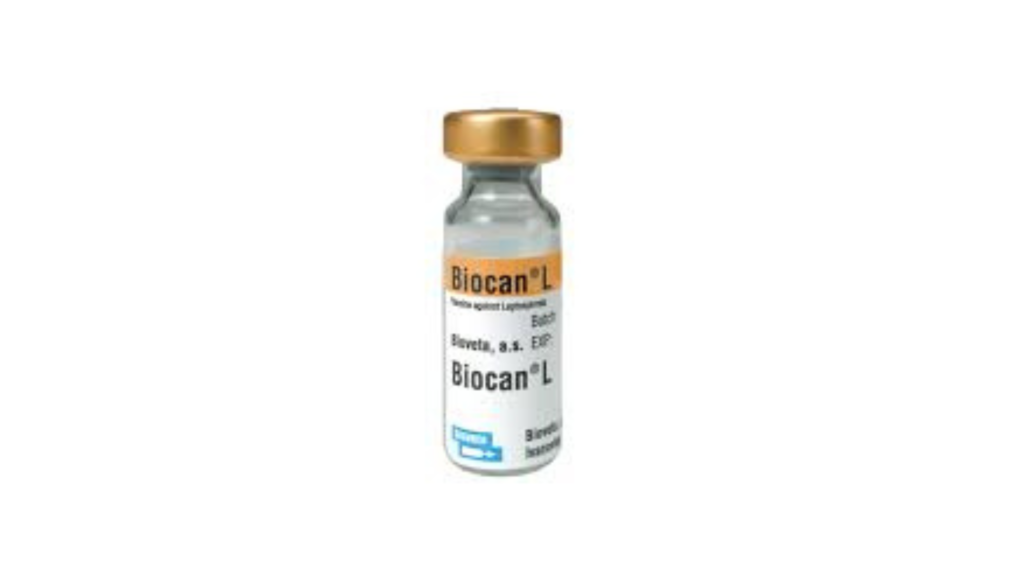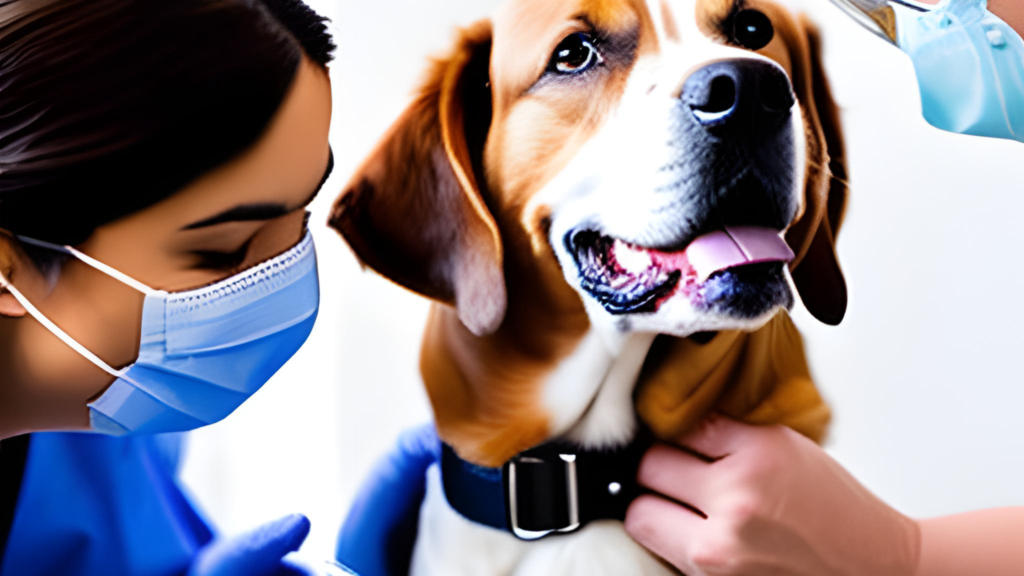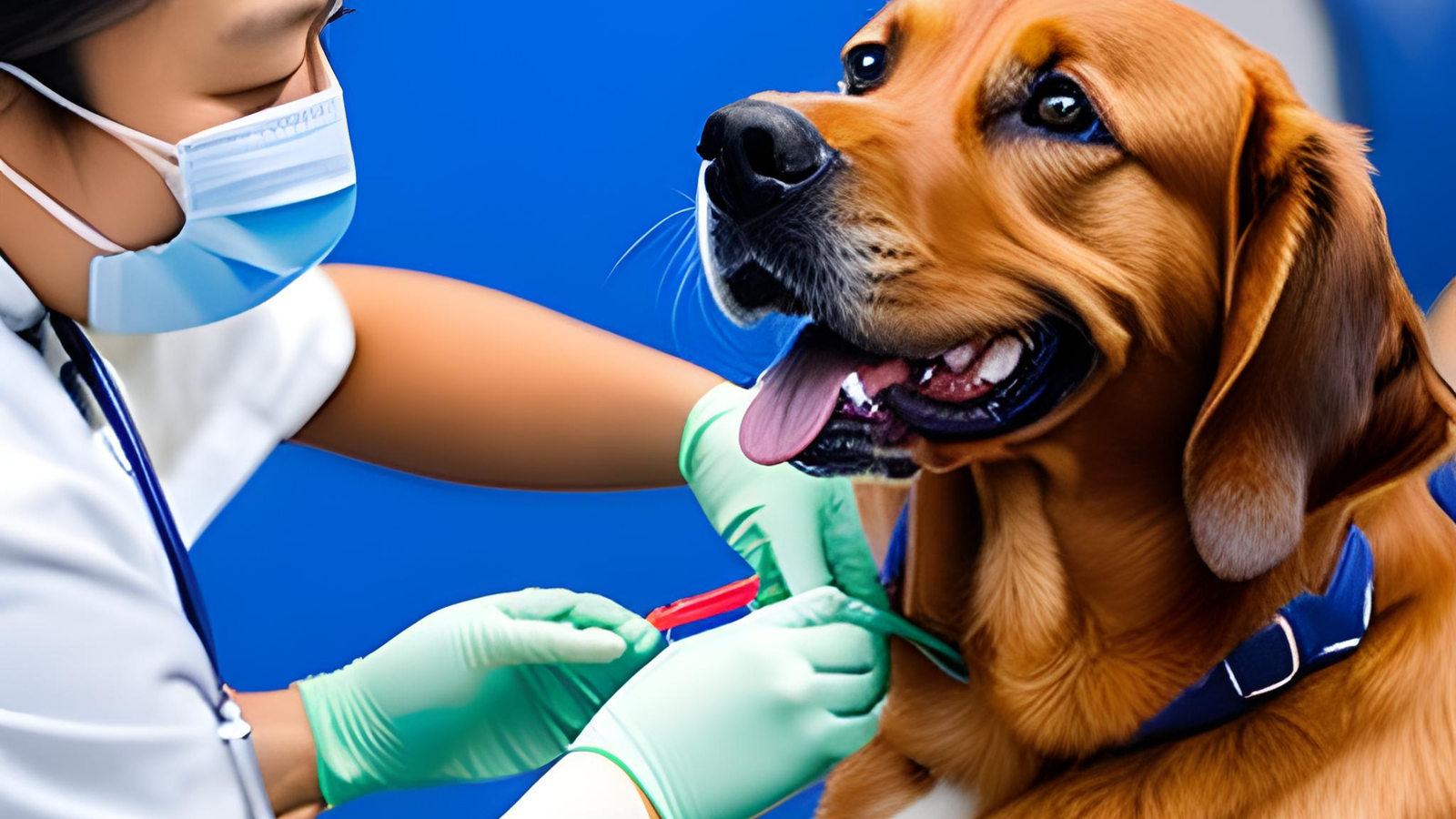As a dog owner, one of the most important things you can do for your pet’s health is to ensure they receive the proper vaccinations. One vaccine that you may have heard of is the Biocan L vaccine. In this article, we will discuss the Biocan L vaccine for dogs, its benefits, potential risks, and everything else you need to know to make an informed decision for your dog’s health.
What is the Biocan L vaccine for dogs?

The Biocan L vaccine protects dogs against certain diseases caused by leptospirosis bacteria. Leptospirosis is a bacterial disease that can affect both dogs and humans.
It is spread through contact with the urine of infected animals, such as rats and other rodents.
The Biocan L vaccine contains inactivated strains of the leptospirosis bacteria and works by stimulating the dog’s immune system to produce antibodies that can fight against the disease.
The Biocan L vaccine is typically given as part of a combination vaccine that includes protection against other diseases such as parvovirus, distemper, hepatitis, and adenovirus.
This combination vaccine is usually given to puppies at around six to eight weeks of age, with boosters given every three to four weeks until the puppy is around 16 weeks old.
Adult dogs may also receive the Biocan L vaccine if they are at risk of exposure to leptospirosis, such as living in areas with a high disease prevalence or coming into contact with wildlife or livestock that may carry the bacteria.
Also Read : Alfalfa Pellets for Dog Litter: Best Guide 2023
Benefits of the Biocan L vaccine for dogs
The Biocan L vaccine for dogs has several benefits, making it a popular choice among dog owners and veterinarians. Here are some of the benefits:
- Protection against multiple diseases: The Biocan L vaccine provides protection against several diseases, including leptospirosis, distemper, hepatitis, parvovirus, and parainfluenza.
- Cost-effective: Since the Biocan L vaccine provides protection against multiple diseases, it is a cost-effective option compared to administering individual vaccines for each disease.
- Long-lasting immunity: The Biocan L vaccine provides long-lasting immunity. Most dogs require only one initial vaccine and a booster shot annually.
- Safe: The Biocan L vaccine, with rare side effects, is considered safe for most dogs.
- Compliance with vaccination laws: Many cities and states require dogs to be vaccinated against certain diseases, including those covered by the Biocan L vaccine, to ensure public health and safety.
Overall, the Biocan L vaccine provides a convenient and effective way to protect your dog against several diseases while complying with vaccination laws.
Potential Risks of the Biocan L Vaccine for Dogs
While the Biocan L vaccine for dogs has many benefits, it also carries some potential risks that dog owners should be aware of. Here are some of the risks:
- Allergic reactions: As with any vaccine, there is a risk of your dog having an allergic reaction. Signs of an allergic reaction may include swelling, hives, difficulty breathing, vomiting, and diarrhoea.
- Side effects: Although rare, some dogs may experience side effects from the vaccine, such as lethargy, fever, and decreased appetite. These symptoms typically resolve on their own within a day or two.
- Overvaccination: Overvaccination is a concern with any vaccine, including the Biocan L vaccine. Administering too many vaccines at once or administering them too frequently can lead to health issues in some dogs.
- Vaccine failure: While the Biocan L vaccine is effective in most dogs, it may not completely protect against all diseases.
It’s important to discuss the potential risks and benefits of the Biocan L vaccine with your veterinarian before deciding whether to vaccinate your dog.
Your veterinarian can provide personalized advice based on your dog’s health and lifestyle.
When and how often should dogs receive the Biocan L vaccine?

The recommended schedule for administering the Biocan L vaccine may vary depending on the dog’s age, health status, and risk of exposure to certain diseases.
However, in general, puppies should receive their first dose of the vaccine at around 6-8 weeks of age, followed by booster shots every 2-4 weeks until they are around 16-18 weeks old.
After the initial vaccine series, most dogs will require a booster shot annually to maintain immunity against the diseases covered by the Biocan L vaccine.
However, the exact schedule may vary depending on the dog’s overall health, lifestyle, and risk of exposure to certain diseases.
It is important to consult with your veterinarian to determine the appropriate vaccination schedule for your dog.
Your vet can evaluate your dog’s needs and help you make informed decisions about protecting your pet against infectious diseases.
Also Read : Can Dogs Have Miso Soup? Is it Safe or Dangerous?
How is the Biocan L vaccine administered to dogs?
The Biocan L vaccine is administered to dogs through an injection under the skin, usually in the scruff of the neck.
The vaccine should only be given by a licensed veterinarian or under the supervision of a veterinarian.
In most cases, puppies receive their first Biocan L vaccine at around 6-8 weeks of age and booster shots every 3-4 weeks until they are 16-20 weeks old.
After that, dogs typically receive a booster shot annually to maintain immunity.
It’s important to note that some dogs may experience mild side effects after receiving the Biocan L vaccine, such as lethargy, soreness at the injection site, or a slight fever.
These side effects usually subside within a day or two and are not cause for concern.
However, suppose your dog experiences more severe side effects, such as vomiting, diarrhea, or difficulty breathing.
In that case, you should contact your veterinarian immediately.
Overall, it’s important to follow your veterinarian’s recommended vaccination schedule for your dog and always ensure they receive their booster shots on time to maintain immunity against the diseases covered by the Biocan L vaccine.
What should I do if my dog has an adverse reaction to the Biocan L vaccine?
If your dog has an adverse reaction to the Biocan L vaccine, it’s important to seek veterinary care immediately.
Some of the signs of an adverse reaction may include lethargy, vomiting, diarrhoea, swelling or redness at the injection site, and difficulty breathing.
In rare cases, more severe reactions may occur, such as anaphylaxis.
Your veterinarian may recommend giving your dog medication to manage the symptoms or taking them to an emergency veterinary clinic for further evaluation and treatment.
It’s important to report any adverse reactions to the vaccine to your veterinarian or the manufacturer to help improve vaccine safety and efficacy.
Alternatives to the Biocan L vaccine for dogs
While the Biocan L vaccine provides a convenient and effective way to protect dogs against several diseases, some dog owners may prefer to explore alternative vaccination options. Here are some alternatives to consider:
- Individual vaccines: Rather than administering a combination vaccine like Biocan L, some dog owners may choose to administer individual vaccines for each disease. This allows for more flexibility regarding which vaccines are given and when they are administered.
- Titer testing involves measuring antibodies in a dog’s blood to determine if they are still protected against certain diseases. If a dog’s titer levels are high enough, it may not need to receive a vaccine for that disease.
- Holistic and natural remedies: Some dog owners may prefer to explore holistic and natural remedies to help prevent and treat diseases in their pets. These can include herbal supplements, acupuncture, and dietary changes.
It’s important to note that while these alternatives may be effective for some dogs, they may not be suitable for all dogs or all diseases.
It’s important to discuss vaccination options with your veterinarian to determine the best course of action for your individual dog.
Also Read : Can Dogs Eat English Muffins? The Surprising Risks You Need to Know
Frequently Asked Questions About the Biocan L Vaccine for Dogs
Is the Biocan L vaccine safe for dogs?
The Biocan L vaccine is considered safe for most dogs, with rare cases of side effects.
How often should dogs receive the Biocan L vaccine?
To maintain immunity, dogs typically receive one initial vaccine and a booster shot annually.
What are some potential side effects of the Biocan L vaccine?
Side effects may include mild lethargy, fever, and localized swelling or pain at the injection site. More serious side effects, such as allergic reactions, may occur in rare cases.
Can my dog receive other vaccines simultaneously as the Biocan L vaccine?
Yes, your dog can receive other vaccines simultaneously as the Biocan L vaccine, but it is important to consult with your veterinarian to ensure that the vaccines are safe to administer together.
Are there any alternatives to the Biocan L vaccine?
Yes, alternative vaccines are available for each disease covered by the Biocan L vaccine, but administering multiple vaccines can be more costly and time-consuming than administering the combination vaccine. It is important to discuss your options with your veterinarian.
Is the Biocan L vaccine required by law?
The Biocan L vaccine is not specifically required by law in most areas, but some cities and states require dogs to be vaccinated against certain diseases, including those covered by the Biocan L vaccine, to ensure public health and safety.
What is the Biocan L vaccine for dogs?
Biocan L vaccine is a combination vaccine that provides protection against several diseases, including leptospirosis, distemper, hepatitis, parvovirus, and parainfluenza.
What is Biocan L for?
Biocan L vaccine is primarily used to prevent and control the spread of various infectious diseases in dogs.
What is the Biocan puppy vaccine for?
Biocan puppy vaccine is a vaccine that is specifically designed for puppies, providing protection against various diseases, including parvovirus, distemper, hepatitis, and parainfluenza.
What is a Biocan puppy?
Biocan Puppy is a vaccine designed for puppies, protecting against various infectious diseases.
Is Biocan anti-rabies?
No, the Biocan vaccine does not provide protection against rabies. There are separate vaccines available for rabies protection.
What causes dog leptospirosis?
Leptospirosis is a bacterial infection caused by a group of bacteria called Leptospira. Dogs can contract the disease through infected urine, contaminated water, or soil.
Which vaccine is better for dogs?
The choice of vaccine for dogs depends on various factors, such as the dog’s age, breed, and overall health. Your veterinarian can guide you in selecting the most appropriate vaccine for your dog.
What is the vaccine for worms in dogs?
Various types of vaccines are available for preventing or controlling worms in dogs, such as heartworm vaccines, roundworm vaccines, and hookworm vaccines.
What are 5 in 1 vaccines for dogs?
The 5 in 1 vaccine for dogs is a combination vaccine that provides protection against five diseases, including distemper, hepatitis, leptospirosis, parainfluenza, and parvovirus.
Which rabies vaccine is best for dogs?
The choice of rabies vaccine for dogs may depend on various factors, such as age, breed, and local laws. Your veterinarian can guide you in selecting the most appropriate rabies vaccine for your dog.
Which rabies vaccine is best?
Various rabies vaccines are available, and the choice of the vaccine may depend on factors such as the dog’s age, breed, and overall health. Your veterinarian can guide you in selecting the most appropriate rabies vaccine for your dog.
Is the rabies vaccine 100% safe?
Like all vaccines, the rabies vaccine may cause side effects in some dogs. However, the vaccine’s benefits in preventing rabies outweigh the potential risks of side effects. The rabies vaccine is considered safe and effective in protecting dogs against rabies.
Final Thoughts: Is the Biocan L Vaccine Right for Your Dog?
Suppose you’re a dog owner looking to protect your furry friend against several common diseases. In that case, the Biocan L vaccine may be a great option.
The vaccine provides protection against multiple diseases, is cost-effective, and provides long-lasting immunity.
However, like any vaccine, there are potential risks and side effects that should be considered, and it’s important to follow the recommended vaccination schedule and discuss any concerns with your veterinarian.
Ultimately, the decision to vaccinate your dog with the Biocan L vaccine or any other vaccine is personal, based on your dog’s health and lifestyle factors.
By working closely with your veterinarian, you can decide what’s best for your furry companion and ensure they receive the necessary protection against common canine diseases.
